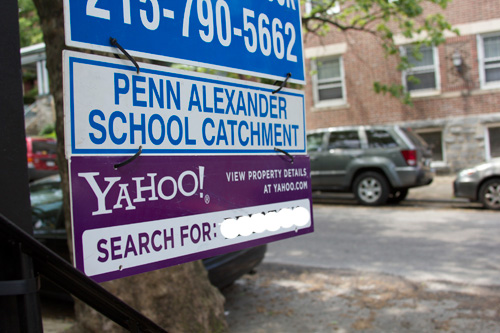Several questions have arisen since the publication yesterday of the story about the Penn Alexander limiting enrollment. We have been pursuing two things today:
One is a legal clarification on what exactly a catchment area means. More information on that is included below. We have also offered an official from the school or the University of Pennsylvania to write a note to parents and community members advising them on further steps for enrollment that we would publish. So far we have not received a reply.
Here is a list of questions to continue the conversation and some answers (Any comments or further clarification are greatly appreciated. Please leave a reply below):
• Is there no school that is obligated to take our kids?
This is where some clarification on the law probably would help. Some have asked if a class-action lawsuit is possible. The wording on the Penn Alexander Home and School Association website about what a “catchment” means is a reflection of the School District of Philadelphia wording: “Any school-age child living within this area is eligible to attend the school.” “Eligible” is the operative word. An education lawyer and former teacher from West Philly (apologies for the anonymity) wrote us that:
The district is under no legal obligation under state or federal law (short of potential mandates under the IDEA or mandates for schools that are under desegregation orders) to place any student in any particular school within its boundaries. Under state law, a district must “enroll” every eligible student within its boundaries in “a” school, but there are no legal mandates giving students an entitlement to a particular school.
There are rights, he continued, to transfer out of “persistently dangerous” schools, but there are no legal requirements for the District to maintain a “neighborhood” school.
• If we don’t get a spot in our neighborhood school (PAS) we’re just supposed to apply to other schools and hope for the best?!
“If I wanted to apply to charter schools or apply to other neighborhood schools I would not have moved into ‘the catchment,’” one reader wrote. Parents with school-age children in the area who want their kids to stay in their neighborhood (to “walk to school”) have the option to send their children to the Henry C. Lea School (4700 Locust) or the Alexander Wilson School (1300 S. 46th St.). West Philly Local is not in business to recommend schools to people, but it should be noted that a tremendous amount of activity has been happening recently at the Lea School. It has a Home and School Association that is growing and the West Philly Coalition for Neighborhood Schools, which now includes nearly 200 parents and community members, is devoting much of its resources and efforts to the school. The website PhillySchoolSearch.com has an excellent primer on the transfer process.
My children may have to attend separate schools?
Penn Alexander officials have said that there will be no provisions made for siblings. As for other schools, again it depends on where you look.
Are there no future plans to expand PAS in the future?
So far, no.
How will enrollment for kindergarten happen if not a lottery?
A Penn Alexander official we talked to was emphatic that there would be no lottery. So in the near future it looks like lining up for the 50 or so spots is the only way. In March January the line-up began the night before registration began. The same school official said preference for first grade for next fall would be given to those students whose parents lined up but did not get a spot in kindergarten, making the fate of those who have to wait for the August 15 registration date even more precarious. This whole process is obviously not sustainable, but an alternative has not been announced.
How much of a dip in our home’s value should we expect?
No one can answer this for sure. Home prices have tripled within the catchment area since the school opened and everyone knows about the catchment premium on houses within the bouadaries (sometimes speculated to be as much as $100,000). It would seem logical to assume that this news will prick the housing bubble in the catchment boundaries. Real estate agents have capitalized on the catchment (see photo above). But home prices near the catchment have also appreciated greatly and if the Lea school keeps improving, there is reason to believe that home prices near it will continue to rise. One question is how many who have been on the fence about selling might be interested in selling right now?









May 12th, 2011 at 3:26 pm
thank you so much for all of these answers and clarifications…I really appreciate it!
Do you know if there are any plans for a community forum on this issue? It seems like families in this neighborhood should at least be able to hear some straight answers directly from PAS and the Philadelphia School District on these changes…and for them to have the opportunity to hear feedback/input from the community…
sara
May 12th, 2011 at 3:45 pm
Thanks for the follow ups. Your passion for this subject really comes through. I particularly appreciate the attorney’s response. However, don’t you think that “How much of a dip in our home’s value should we expect?” is a loaded question?
I’m curious, does the author own or rent property in the catchment?
May 12th, 2011 at 4:07 pm
Hi John. I didn’t ask the question (or any of the questions in the story). The reader Sara (above) did. Here is the link to her comment. Her questions are very indicative of others we have seen. That’s why we used them.
https://www.westphillylocal.com/2011/05/11/in-catchment-or-not-penn-alexander-will-be-forced-to-turn-new-students-away/#comment-5061
Our passion is this neighborhood. We live here. That’s why we started this website.
May 12th, 2011 at 4:13 pm
Thanks for clarifying. Keep up the great work.
May 12th, 2011 at 5:56 pm
Mike, thanks for doing the research and writing such a helpful article. West Philly Local is now a site I visit daily.
May 12th, 2011 at 8:13 pm
What exactly are the 1-3 grade numbers? How many students per grade? Are they the same as Kindergarten now? When will this change take place? I know there is a quote that children waitlisted for kindergarten will be looked at first for 1st grade, but what if they are still not picked up? What then, do the parents just hope for 2nd grade and so on?
May 12th, 2011 at 9:50 pm
@April, kindergarten is 17 at PAS. There are three first grades and the other article said they are targeting 23 per class. This year the first grades were over 30.
I suppose if a kid doesn’t come off the waitlist for first, they’d stay on it for second onward. Based on the previous article, everyone would certainly come off the waitlist by fifth because the upper grades have lower enrollment.
May 12th, 2011 at 11:12 pm
Recently read some reviews of Penn Alexander on greatschools.com and it seems that a lot of families opt to send their middle school aged children to the city’s prestigious middle schools (i.e. masterman) once they hit 5th grade. If this is a trend with a substantial history, it may be beneficial to have more K-3 classrooms and as children turn 11, the school enrollment will naturally drop. Since there are about 250 open spaces in the upper grades, why can’t these vacancies be turned into K-3 openings? I understand maybe the school doesn’t want to take the chance of being over enrolled in the upper grades in the future, but just a thought….
May 13th, 2011 at 6:45 am
My only hope is that if Penn Alexander is able to cap enrollment at lower grades, that the district be held accountable for keeping the same standard of low class size for other neighborhood schools.
May 13th, 2011 at 9:18 am
Thanks for the this informative followup, Mike, and for writing this important article in the first place.
I guess the biggest question I still have about PAS is why it continues to be classified as a public school when it acts like a charter school. If the same rules don’t apply in terms of admissions, union contracts, and so on at PAS as at other SDP schools, why are we calling it an SDP school and not a charter school?
If it looks like a duck and quacks like a duck…
May 13th, 2011 at 10:45 am
Mike, what do you mean by your statement, “Real estate agents have capitalized on the catchment…”?
Real estate agents market a product – houses – for our clients, homeowners. Our clients expect us to advertise their properties’ amenities! In University City, we would be remiss if we didn’t make potential buyers aware of, for example, parking. And Victorian features. And central a/c. And location in the Penn Alexander catchment area.
Were you in the neighborhood when the school was first proposed? Perhaps you aren’t aware that most of the local Realtors were not in favor of a fixed catchment area. Don’t blame us for the demand for the school which raised prices!
Melani Lamond
Associate Broker
Urban & Bye, Realtor
(this comment is my personal opinion and not the opinion of the firm for which I work)
May 13th, 2011 at 11:08 am
Hi Melani. I am not “blaming” you for anything. I am not implying that real estate agents did anything nefarious. Perhaps my sentence was misleading. I agree exactly with your statement – it’s a selling point that many agents prominently advertise regardless of what they thought when the school was formed.
May 13th, 2011 at 11:19 am
Regarding “blaming” Realtors: Yes, being in the catchment area for the school helps sell a house, and advertising the amenities of a house is your job. Now that it’s clear that being in the catchment doesn’t guarantee a young child a place at the school, it should follow that the value of that particular amenity – location in the catchment – should fall. You aren’t being blamed for rising or falling home prices – geez, there’s bubbles bursting all over the place nowadays!
May 13th, 2011 at 2:48 pm
I for one need to start saving money…for not only did we pay a lot for our house… but in a few years we may also need money for private school. I feel we did not get what we paid for, don’t get me wrong, I love west philly and will not move because of this, but if our kid does not get into PAS we will have the big mortgage AND the private school expense….
Penn and Drexel need to think about what this will do for our neighborhood that houses students and faculty members… they just got the stability and safety brought into the neighborhood, this kind of thing could begin a slow reversal of the recent trend, and should be a concern. If we drive families (not us but potentially many others) out to the suburbs in search of better schools, that is also not good for reducing people’s carbon footprints – city living is green living! These universities also get a more involved and community oriented faculty due to have faculty nearby.
May 15th, 2011 at 6:23 pm
It says above that there are currently no plans to expand PAS. Why is that? Is it because Penn wouldn’t want to or be able to expand its subsidy program to cover an increased enrollment? If that is not the problem, why doesn’t the school put up some temporary/trailer classrooms? They could do it in the black top area, or in that garden area along Locust Street. Not ideal, but this is often what schools do when they are oversubscribed. If numbers remain high, they could look into permanent expansion. Why isn’t expansion being considered?
May 16th, 2011 at 2:02 pm
@ Mike Lyons – Great work here.
@ Jo – I was wondering the same thing. Seems like if the school is only at 72% capacity overall (see original article), then we are talking about a problem that doesn’t exist. Perhaps there are legitimate reasons why it is impractical to turn a 7th grade room into an additional 1st or 2nd grade room, but the district (and Penn) at least owes the community an explanation.
@ drd – Assuming the capacity issues are legit, then PAS isn’t being treated any differently than any other “district” school that gets too crowded. Plus, teachers at PAS are part the union just like all other teachers in the district. The charter analogy simply does not work.
@ DK – Again, assuming overcrowding (of the school) is real, then expansion makes no sense and would be incredibly fiscally irresponsible. There are plenty of nearby schools with open seats.
@ Everyone – We have a Home and School Association at PAS, which is responsible for fund raising types of things. But we could also form a School Advisory Council, similar to what exists in the Renaissance schools. This would at least create a forum in which the District would have to meet with us (not necessarily listen…) and discuss some of the options that the community can propose. Does anyone know who the contact at Penn would be to discuss issues related to PAS?
May 16th, 2011 at 3:36 pm
David —
Thanks for your thoughtful comments…they mirror some of my concerns and questions…
I would love to attend a meeting or the sort of forum that you mentioned…
I have no helpful connections but would love to be a part of this…
Sara
May 18th, 2011 at 2:01 am
A question for all of us living in the catchment:
Would you support a PAS move to admission by lottery that included a preference for siblings already enrolled? I personally hate the January line-up, which forces friendly neighbors into competition. I have kids already attending PAS, so of course a lottery with sibling preference sounds good to me. How much do those of you hoping to place your first kid in kindergarten hate this idea?
I figure that a decline in housing prices will come weather the school institutes a lottery or just continues to turn people away. Is a lottery more fair than the tag-team all-nighter now required, more fair than re-drawing the catchment, more realistic than hoping for the school to expand?
May 18th, 2011 at 6:31 am
Just wanted to say that these are both really useful threads. It would be hard to get this information anywhere else. Thanks to Westphillylocal and Mike!
May 18th, 2011 at 2:37 pm
Aimee – I am 100% with you. There should be a lottery and there should be sibling preference. Any other arrangement is unfair.
Even those who don’t have a sibling in the school now should go for this (because they might in the future) and because no one should want to break up families.
May 18th, 2011 at 6:45 pm
Can I ask what might be a stupid question about the “line-up” references I keep seeing? I no longer live in Philadelphia though I do still own a home in West Philly and my mother and many, many friends still live there. Our home is just outside catchment so PAS was never going to be an option for us, but several of my children’s friends are just at the age to start there so I have been following the story with great interest. But I am confused about how that part of the process works. Is it what it sounds like–that people stand in line for hours as some do for concert tickets or new computer gadgets?
May 18th, 2011 at 8:37 pm
@Matilda
Yes, it is just like a line up for concert tickets. Parents started lining up early evening the night before, and waited outside during one of the coldest nights this winter. I unfortunately did not know about this ” sleepover”, and when I arrived about a half hour before the registration was supposed start and we were given the #77. Since, we have no chance into PAS and there are no other very good options we have to pay for private school this year. Although, PAS promised us a position for 1st grade. I really hope they keep there word.
May 19th, 2011 at 12:17 pm
I have to say that I am surprised by how quickly people are swallowing this bad pill. Didn’t we all just read the article that we paid an extra $100,000 to live in a home where our kids could attend PAS?!
Why are we accepting this news as inevitable and unchangeable? I appreciate people’s comments here…and I agree with many of them. But who is listening?
Why are we emailing each other with ideas about lottery vs lining up and sibling preference vs no sibling preference? I don’t think anyone with any power in this situation asked our opinion or feedback…
I continue to have questions:
Why is the school not expanding to accomodate the growing community?
Why not support Lea and Wilson to the same degree (financially) to expand the model of PAS?
Why not restructure the school to reflect the imbalance of enrollment from the younger ages to the older ages?
Why is the school not planning on a sibling preference?
Why is the school sticking with lining up instead of a lottery?
If PAS is at 72% enrollment and Lea is also at 72% enrollment, then why are we being told that Lea is a viable alternative?
How many children does PAS anticipate having to turn away with this current model?
What (exactly) do they plan to do help place the kids who get turned away from PAS?
What has happened in other neighborhoods with similar situations?
PAS is a part of our community…and as such, it should be accountable to that community. I understand that the school may not yet have the answers to all these questions…and may or may not be open to feedback and alternatives. But I also know there are many smart, driven people who care very much about education…So, I am sure that a conversation amongst all those people is bound to be fruitful.
Does anyone know how to make such a meeting happen? Perhaps with the PAS principal or the officers of the Home School Association? Perhaps with the Philadelphia School District? Perhaps with our city councilperson? Mike, do you know who might be best to follow up with?
Even if I don’t like the answers in the end, it would be great to know where we stand…
If anyone else is interested in setting up some kind of meeting, etc…please drop me a line at saraforgione@yahoo.com
thanks.
ps – getting back to the earlier comments: I too prefer a sibling preference…it just makes sense to keep families together. And I also prefer lining up instead of a lottery…I don’t trust lotteries and lining up for a spot may be the only control I have left in where my kids get their education…I should probably go line up now for my 3 year old, right?!
May 19th, 2011 at 1:06 pm
Thank you for responding, although I am a little shocked that it works that way. Is this a common practice for schools? I had no idea.
I would also like to know why Lea and Wilson do not share the same financial support as PAS. The university is one of the largest landowners in the city but as an educational entity it is not required typical real estate taxes. That seems like an awful lot of lost revenue, especially for such a well funded institution. It seems they should have some accountability. Or does Philadelphia not use real estate taxes to fund education?
May 20th, 2011 at 3:37 pm
@Sara – So many people have so many questions. I would really like to put together some kind of community forum where people could get answers. We tried pretty hard to get some kind of response from PAS people, but they didn’t want to say anything publicly to us. They still don’t. (BTW, we have a son who goes to school there so it got a little awkward at times). But maybe they would be more comfortable talking directly to people in a discussion kind of setting. I will start putting something together. Who (what panelists) would you like to see at such a gathering?
May 20th, 2011 at 9:55 pm
@Sara – PAS is 72% enrolled but 100% catchment whereas Lea is 72% enrolled but approximately a third of its students are out of catchment, fyi. The district might be thinking that Lea could perhaps take PAS catchment kids in lieu of/in addition to children from other catchments.
June 9th, 2011 at 1:30 pm
I want to encourage all concerned homeowners/parents within the catchment of PAS to attend the next Spruce Hill Community Association (SHCA) meeting, which is scheduled for Tuesday, 06/14/11 at 7:30pm.
It is my understanding that SHCA stuck its neck out on the line ~10 years ago when the PAS was being developed (in that it advocated for PAS and a fixed catchment area, I believe). SHCA is one of the neighborhood groups that Penn and the School District consulted with when PAS was being developed. It seems to me that SHCA has a role in trying to investigate and advocate for the community by asking Penn and the school district the following:
1. How was the decision made to enforce the strict enrollment cap for the lower grades?
2. Who made the decision?
3. Did Penn consider the potential damage to its reputation as a leader in the field of university-sponsored urban investment/renewal when this policy change was being considered? Judith Rodin touted Penn’s partnership with community/neighborhood groups during her tenure as Penn’s president.
4. Why not consider expanding the school (as others have suggested)?